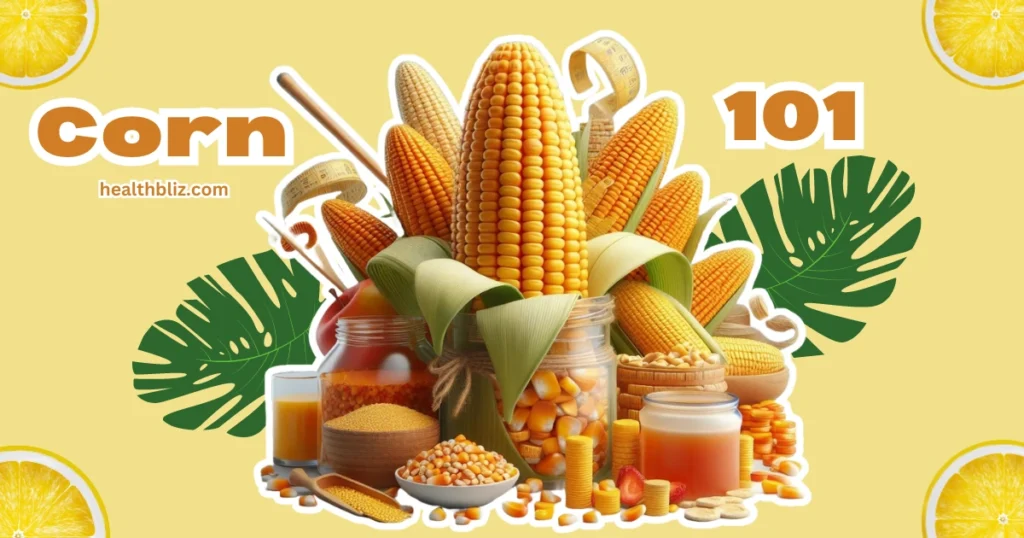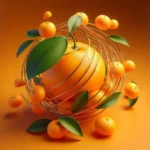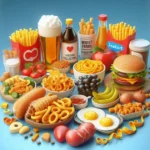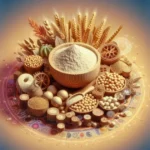
Corn, scientifically known as Zea mays, is a widely recognized cereal grain commonly known as maize. Belonging to the grass family, this plant’s seed is native to Central America and has been cultivated in numerous diverse forms across the globe. It is a nutritious grain high in fiber, vitamins, minerals, and antioxidants. Consuming corn may benefit both eye and digestive health. Processed corn products, such as tortilla chips, provide fewer health benefits.
Popcorn and sweet corn are favored selections, with processed corn products being widely consumed and commonly utilized in the production of various foods. These include tortillas, chips, polenta, cornmeal, corn flour, corn syrup, and corn oil. Whole-grain corn is as nutritious as any other cereal grain, with a high fiber content and a variety of vitamins, minerals, and antioxidants. While corn is usually yellow, it can also be found in various other colors, such as red, orange, purple, blue, white, and black. Everything you need to know about corn is covered in this article.
Types of Corn
You might have observed yellow and white sweet corn varieties at the supermarket; however, there are other kinds of corn that serve distinct purposes. Here is an overview.
- Dent corn, also known as field corn, exhibits a distinctive dent in the kernel. This prevalent variety is extensively grown in the United States and serves as a primary source of livestock feed.
- Sweet corn, known for being consumed directly from the cob, possesses a higher sugar content, resulting in its distinctively sweet flavor. This particular variety can be found in the produce section of grocery stores and is also available at farmers’ markets during the sweet corn’s peak season.
- Lint corn, a vibrant variety of dried corn, is commonly employed for decorative purposes. It is frequently showcased during autumn festivities such as Halloween and Thanksgiving.
- Popcorn, classified as a variety of flint corn, possesses a certain level of moisture within its kernels. As the kernels are subjected to heat, the moisture within them creates pressure, leading to their eventual explosion.
Nutrition facts
Here are the nutrition facts, according to the USDA: 3.5 ounces (100 grams) of boiled yellow corn.
- Calories: 96
- Water: 73%
- Protein: 3.4 grams
- Carbs: 21 grams
- Sugar: 4.5 grams
- Fiber: 2.4 grams
- Fat: 1.5 grams
Fiber
Corn is a good source of fiber. A single serving of cinema popcorn (112 grams) provides about 16 grams of fiber. This amount represents 42% and 64% of the daily value (DV) for men and women, respectively. The fiber content in various types of corn may differ, but typically ranges from 9–15% of the dry weight. The main types of fiber found in corn are insoluble, including hemicellulose, cellulose, and lignin.
Carbs
Corn, like other cereal grains, is mainly made up of carbohydrates. Its primary carbohydrate is starch, which makes up 28–80% of its dry weight. In addition to starch, corn contains small amounts of sugar, ranging from 1–3%. Sweet corn, also known as sugar corn, is a unique variety with a lower starch content and a higher sugar content, making up 18% of its dry weight. The majority of the sugar in sweet corn is sucrose.
Despite the presence of sugar in sweet corn, it is considered a low- to medium-glycemic food, as it ranks low on the glycemic index (GI). The GI measures how quickly carbohydrates are digested, with foods ranking high on the index potentially causing unhealthy spikes in blood sugar levels.
Protein
Corn serves as a satisfactory protein source, with its protein content varying between 10 and 15%, depending on the type. The primary proteins found in corn, known as zeins, make up a significant portion of the total protein content, ranging from 44–79%. However, the protein quality of zeins is considered subpar due to their deficiency in essential amino acids. Zeins find extensive use in various industries, such as the manufacturing of adhesives, inks, and coatings for pills, candy, and nuts.
Vitamins and minerals
Corn can possess a considerable quantity of various vitamins and minerals. It is worth mentioning that the quantity greatly varies depending on the type of corn.
Popcorn
This well-liked snack contains numerous vitamins and minerals, such as:
- Manganese: Manganese is a crucial trace element found abundantly in whole grains, legumes, fruits, and vegetables. However, its absorption from corn is limited due to the high content of phytic acid present in this vegetable.
- Phosphorus: Popcorn and sweet corn are both good sources of phosphorus, an essential mineral that is necessary for the proper growth and maintenance of body tissues.
- Magnesium: Maintaining adequate levels of magnesium is important for overall health, as low levels may increase the risk of various chronic illnesses, including heart disease.
- Zinc: This trace element performs many essential functions in the body. However, due to the presence of phytic acid in corn, its absorption may be hindered.
- Copper: Copper is an antioxidant trace element that is typically low in Western diets. Insufficient intake of copper may have negative impacts on heart health.
Sweet corn
- Pantothenic acid, also known as vitamin B5, is present in nearly all foods, making a deficiency rare.
- Folate: Essential for various bodily functions, especially crucial during pregnancy, folate is also known as vitamin B9 or folic acid.
- Vitamin B6: This group of related vitamins, with pyridoxine being the most common, serves diverse functions in the body.
- Niacin: Also referred to as vitamin B3, niacin found in corn may not be well absorbed. However, cooking corn with lime can enhance the availability of this nutrient for absorption.
- Potassium: An essential nutrient, potassium aids in blood pressure regulation and contributes to heart health.
Health benefits of corn
Regular consumption of whole grains may offer several health benefits.
Eye Health
Corn is rich in carotenoids like lutein and zeaxanthin, which have positive effects on eye health. These compounds act as antioxidants, protecting the eyes from oxidative damage and reducing the risk of age-related macular degeneration and cataracts.
Improve Brain Health
Corn contains essential vitamins and minerals, such as vitamin B6 and magnesium, which are beneficial for brain function and cognitive health. Consuming sufficient amounts of these nutrients can potentially enhance memory, focus, and overall brain function.
Energy Boost
Corn is a rich source of carbohydrates, which serve as the body’s primary source of energy. Consuming corn can provide a sustained energy boost, making it an excellent addition to an active lifestyle.
Lower Risk of Chronic Diseases
Incorporating corn into your diet can help lower the risk of chronic diseases due to its fiber content, antioxidants, phytonutrients, and whole grain benefits. These components contribute to better digestive health, reduced inflammation, improved weight management, and overall well-being.
Potential downsides
Mycotoxin Contamination
Corn is susceptible to fungal contamination, particularly from molds like Aspergillus and Fusarium, which can produce mycotoxins. Mycotoxins are toxic compounds that, when consumed in large quantities, can be harmful to one’s health. Proper storage and processing methods can reduce the risk of mycotoxin contamination in corn products.
Concerns with Genetically Modified Corn
A significant portion of corn crops grown globally are genetically modified to improve resistance to pests and herbicides or enhance certain traits. While genetically modified organisms (GMOs) are deemed safe for human consumption by regulatory agencies, some people prefer to avoid GMOs due to ethical, environmental, or health concerns.
High Carbohydrate Content
Corn contains a lot of carbohydrates, the majority of which are starches. While carbohydrates provide energy, excessive consumption, particularly of refined corn products, can cause blood sugar spikes and may contribute to insulin resistance and type 2 diabetes.
Frequently Asked Questions
Q1: Is corn a rich food?
A1: Corn boasts a high content of fiber, vitamins, and minerals.
Q2: Can I eat corn everyday?
A2: Yes, you can eat corn every day as part of a balanced diet, but it’s essential to vary your food intake and consume corn in moderation to avoid potential downsides associated with its high calorie and carbohydrate content.
The Bottom Line
Among the most commonly consumed cereal grains, corn holds a significant position. Its yellow variety, known for its antioxidant carotenoids like lutein and zeaxanthin, can play a role in promoting eye health. Furthermore, it is a rich source of various vitamins and minerals, making it a valuable addition to a balanced diet.
People Also Like To Read:


